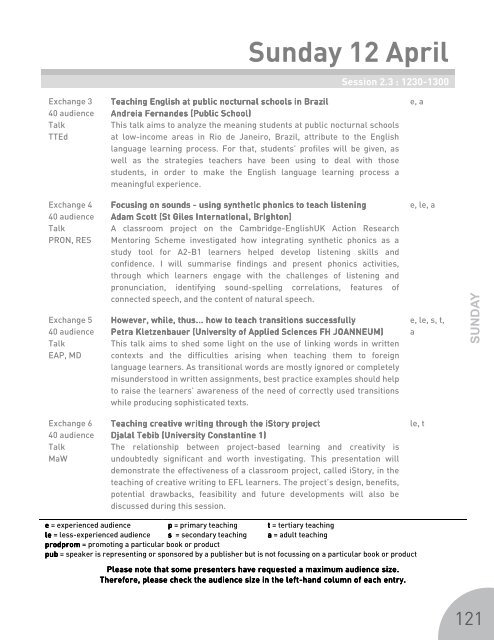Create successful ePaper yourself
Turn your PDF publications into a flip-book with our unique Google optimized e-Paper software.
Sunday 12 April<br />
Session 2.3 : 1230-1300<br />
Exchange 3<br />
40 audience<br />
Talk<br />
TTEd<br />
Teaching English at public nocturnal schools in Brazil<br />
Andreia Fernandes (Public School)<br />
This talk aims to analyze the meaning students at public nocturnal schools<br />
at low-income areas in Rio de Janeiro, Brazil, attribute to the English<br />
language learning process. For that, students’ profiles will be given, as<br />
well as the strategies teachers have been using to deal with those<br />
students, in order to make the English language learning process a<br />
meaningful experience.<br />
e, a<br />
Exchange 4<br />
40 audience<br />
Talk<br />
PRON, RES<br />
Exchange 5<br />
40 audience<br />
Talk<br />
EAP, MD<br />
Focusing on sounds - using synthetic phonics to teach listening<br />
Adam Scott (St Giles International, Brighton)<br />
A classroom project on the Cambridge-EnglishUK Action Research<br />
Mentoring Scheme investigated how integrating synthetic phonics as a<br />
study tool for A2-B1 learners helped develop listening skills and<br />
confidence. I will summarise findings and present phonics activities,<br />
through which learners engage with the challenges of listening and<br />
pronunciation, identifying sound-spelling correlations, features of<br />
connected speech, and the content of natural speech.<br />
However, while, thus... how to teach transitions successfully<br />
Petra Kletzenbauer (University of Applied Sciences FH JOANNEUM)<br />
This talk aims to shed some light on the use of linking words in written<br />
contexts and the difficulties arising when teaching them to foreign<br />
language learners. As transitional words are mostly ignored or completely<br />
misunderstood in written assignments, best practice examples should help<br />
to raise the learners’ awareness of the need of correctly used transitions<br />
while producing sophisticated texts.<br />
e, le, a<br />
e, le, s, t,<br />
a<br />
SUNDAY<br />
Exchange 6<br />
40 audience<br />
Talk<br />
MaW<br />
Teaching creative writing through the iStory project<br />
Djalal Tebib (University Constantine 1)<br />
1<br />
The relationship between project-based learning and creativity is<br />
undoubtedly significant and worth investigating. This presentation will<br />
demonstrate the effectiveness of a classroom project, called iStory, in the<br />
teaching of creative writing to EFL learners. The project’s design, benefits,<br />
potential drawbacks, feasibility and future developments will also be<br />
discussed during this session.<br />
le, t<br />
e = experienced audience<br />
le = less-experienced audience<br />
p = primary teaching<br />
s = secondary teaching<br />
t = tertiary teaching<br />
a = adult teaching<br />
prodprom = promoting a particular book or product<br />
pub = speaker is representing or sponsored by a publisher but is not focussing on a particular book or product<br />
Please note that some presenters have requested a maximum audience size.<br />
Therefore, please check the audience size in the left-hand column of each entry.<br />
121


